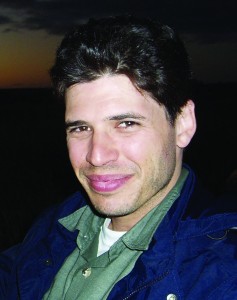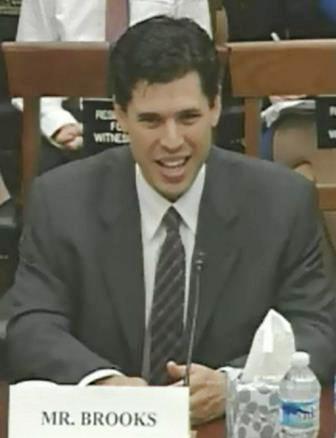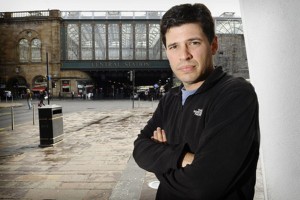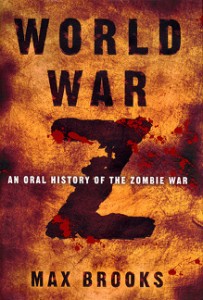 We first met the acclaimed author and speaker Max Brooks in 2014 on Capitol Hill, where he spoke passionately to Members of Congress about the need for systemic change in the education community. Last month, Brooks enthralled the Learning Ally community when he keynoted our second annual Spotlight on Dyslexia online conference. A portion of his professional bio reads: "The son of Hollywood legends Mel Brooks and Anne Bancroft, Max Brooks is dedicated to challenging and encouraging systems and institutions to think outside the box when problem solving. Even his fiction, while undeniably entertaining, works to raise awareness on the issues of disaster preparedness, crisis management, and survival for the common reader—all under the thematic guise of a zombie apocalypse." Fittingly, Max titled his Learning Ally keynote "Taking on World War D: Dyslexia." We relished a chance to sit down with him for a far ranging conversation about the LD world today.
A whole lot has changed for kids with dyslexia since you were a child, yet maybe some things haven't yet changed at all. What's your message to parents today?
We first met the acclaimed author and speaker Max Brooks in 2014 on Capitol Hill, where he spoke passionately to Members of Congress about the need for systemic change in the education community. Last month, Brooks enthralled the Learning Ally community when he keynoted our second annual Spotlight on Dyslexia online conference. A portion of his professional bio reads: "The son of Hollywood legends Mel Brooks and Anne Bancroft, Max Brooks is dedicated to challenging and encouraging systems and institutions to think outside the box when problem solving. Even his fiction, while undeniably entertaining, works to raise awareness on the issues of disaster preparedness, crisis management, and survival for the common reader—all under the thematic guise of a zombie apocalypse." Fittingly, Max titled his Learning Ally keynote "Taking on World War D: Dyslexia." We relished a chance to sit down with him for a far ranging conversation about the LD world today.
A whole lot has changed for kids with dyslexia since you were a child, yet maybe some things haven't yet changed at all. What's your message to parents today?
Well, I can tell you that for parents, they have to be aware. You can never have enough awareness. And I strongly advocate for early detection because so much of the problem -- I would say 75 to 80-percent of the problem of any kid with LD is self-esteem. And if you can nip that in the bud early, then you've not only won half the battle, you've won three quarters of it.
If you let it fester, even if you solve the LD, it won't matter because then that kid's going to carry around self-esteem issues into adulthood, and they'll be spending the rest of their lives trying to climb out of that hole. And I am watching parents make horrendous decisions that will have long term consequences.
 How were you able to avoid that direction and circumvent things early on?
How were you able to avoid that direction and circumvent things early on?
Because I had the best mom ever. I had a mom who somehow, God knows how in the late 70s/early 80s, heard about dyslexia and got me tested at a very young age, got me tutored at a very young age, and was honest with me at a very young age.
So being dyslexic became part of my identity; and so I learned how to advocate, and learned how to live with it. And so I got to minimize the amount of years banging my head against the wall wondering what was wrong with me. So then I could spend as much time as possible learning coping mechanisms instead of playing psychological detective.
You were fortunate to have that kind of start in life.
Yeah. . .Recently I've just watched two parents delay and delay and delay. And every month, every week, a kid's self esteem gets lower and lower and literally I had a conversation with the father who said, "Well, we're sort of hoping that our daughter will, you know, grow out of it. . .that maturity will sort of take over."
I've seen how some kids end up on an express train to a heroin needle because maturity has nothing to do with a learning disability, and the longer you wait, the more anxiety and self hatred is going to happen. And I can tell you, a lot of the kids I grew up with got into drugs simply because they were self medicating. So I think early detection, broad detection, and broad acceptance are pivotal.
So what actions will help?

I think there's a bunch of things we can do. As I had told Congress last year, the number one thing is that any new teacher, in order to get their teaching certificate, has to take a dyslexia recognition training course. They don't have to solve the problem; they just need to be able to flag it.
And that's the most important thing the school system can do, because we have organizations like yours around the country who are working to solve the problem, but they can't solve the problem if it's not identified. And the first responsibility is to flag these kids, and the sooner the better. I think that should be mandatory for being a teacher in this country.
Then the next thing is, we need a national database of heroes with dyslexia; and this is what we can learn from the African American community. You walk into any African American community center, the walls are plastered with pictures of their heroes. And those heroes have a message: "Yes, you can too." When I was a kid, all we had was Bruce Jenner. And all I got from that was if I ever decided to be a pole vaulter, then dyslexia wouldn't stop me.
[Laughter.]
"I had a mom who somehow heard about dyslexia and got me tested and tutored at a very young age."
And so with any kid who is is flagged with dyslexia, then literally the day these kids come home from being tested and diagnosed -- that day they can sit with their parents at the computer and look at a whole list of famous, successful, intelligent people who have or who have had dyslexia.
That's the first thing that they need to find out: "Oh, yeah. You have this thing called dyslexia. Guess what? So did all these other people, and they did just fine." Right away, that takes a layer of anxiety edge off.
There needs to be an outreach not just to kids, but I think there needs to be a public outreach to dyslexic people of my generation because it's stigmatized. You know, it's not so stigmatized now for kids growing up, which is awesome. I think we've already won that battle. But people my age and older still hide it. And so I think we need more people of my generation to be open about it in order to help the generation coming up.
You know, I met a guy who gives a lot of money to dyslexia organizations. He's a huge financial guy and he won't tell anybody because he doesn't want people to lose trust in him. He thinks that they think that he'll screw up a number or a decimal point and lose them a billion dollars.
Well, he's obviously not Charles Schwab, because Schwab is very public about his dyslexia.
And we need more Charles Schwabs. I mean, when I was in Army ROTC, I learned that dyslexia, it can disqualify you for military service. And I think that's horrible because that tells kids, "You're not good enough to serve your country."
 And even General Patton was dyslexic
And even General Patton was dyslexic.
There's so many people who were! I mean, there's so many creative outside thinkers who are dyslexic and, by the way, that's one of the things that I discuss when I work with the West Point Naval War College. I just joined a think tank and we're always talking about outside the box thinkers. And the military's very interested now in that. So I think we're making a stride forward.
That's good to hear, because when we covered that topic in a blog, it was disheartening. It was basically, if you tell them you have a learning disability and use accommodations, you're out, you know?
The good news about the military -- and this is something that I think America doesn't really understand -- is that the military has actually led the way in social change in this country. The Navy desegregated before the rest of the country did. They gave jobs and opportunities to women before the rest of the country even allowed women to vote. They have allowed gay people to get married. I think with just a little bit of prodding, the military can lead the way in learning disabilities.
One of the stigmas that we run into is an embedded notion on the part of some educators who say that "listening to books is not real reading. It's a crutch." And that's a big impediment that we've got to get over.
I think this is a psychological problem with teachers that needs to be addressed. A lot of teachers became teachers because they were the nerd in the class and naturally gravitated towards reading. They were the ones who would disappear to the corner with a book. And it is very hard for them to understand why anybody, LD or not, just doesn't have that love for reading that they do.
And I think we need to speak to teachers in their own language and say, "Listen, kids should learn however they need to learn." I mean, I learned through audio books. That's how I learned, otherwise I wouldn't have graduated high school. And I think this sort of early 20th century notion of studying by rote and by text needs to be abolished. We need to have flexible thinking on the part of the teachers before we even begin to help the kids.
* * * * * *
You can access Max Brooks' keynote and immerse yourself in 20 other presentations from dyslexia thought leaders and education experts at Spotlight on Dyslexia --
available on-demand online until February 4, 2016.